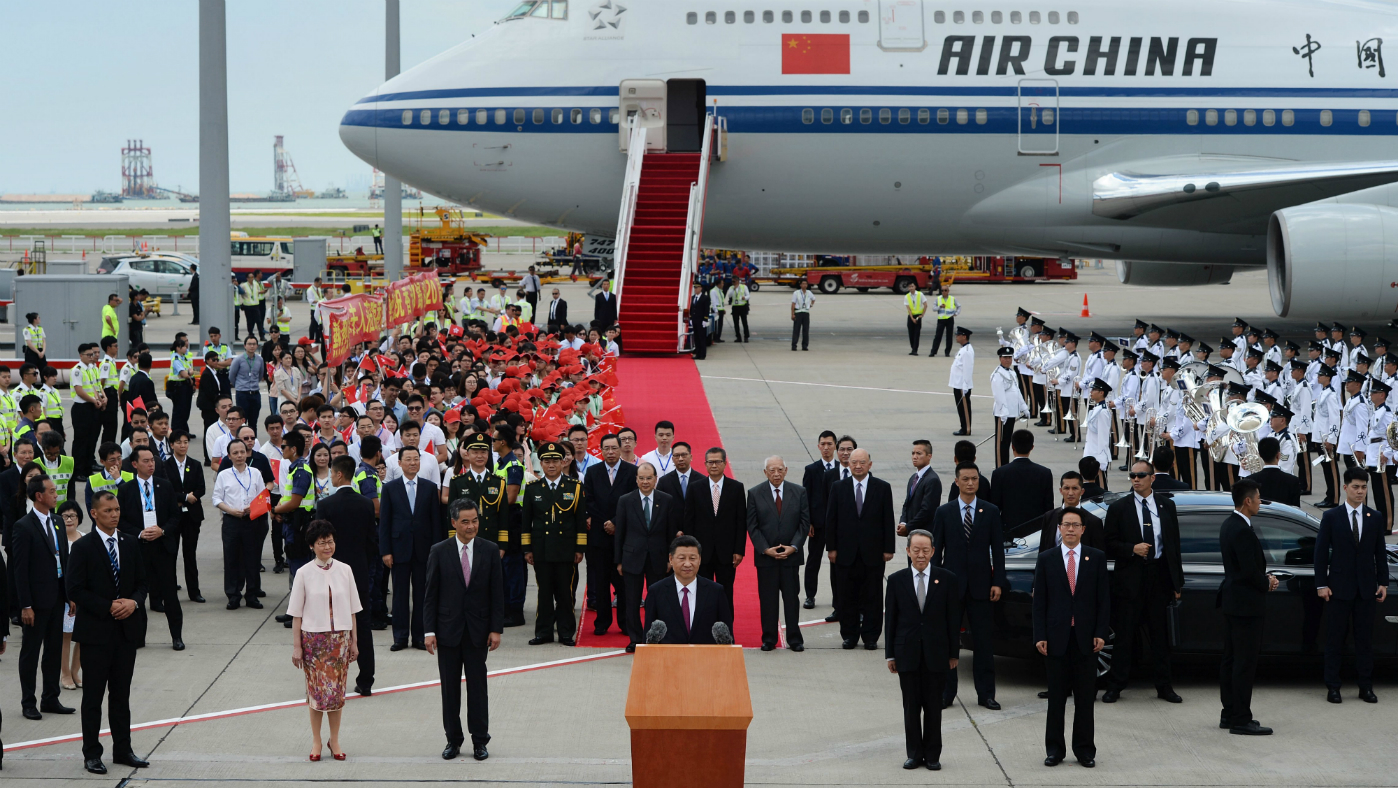Protests as Xi Jinping arrives for Hong Kong 20th anniversary
Chinese President’s visit marked by celebrations, arrests and a sit-in

A free daily email with the biggest news stories of the day – and the best features from TheWeek.com
You are now subscribed
Your newsletter sign-up was successful
Chinese President Xi Jinping was met with jubilation and demonstrations today on his first trip to Hong Kong in an official visit designed to mark two decades of Chinese rule in the former British territory.
Well-wishers greeted Jinping at the airport, but protesters have been active in the run-up to the visit. Prominent Hong Kong protesters, including Nathan Law and Joshua Wong, were arrested after they staged a sit-in the night before the President's visit.
"For the past 20 years, Hong Kong has always had the strong backing of the central government," the President told crowds at Hong Kong airport on Thursday, encouraging citizens to "look forward to the future, making sure 'one country, two systems' can work smoothly and continue".
The Week
Escape your echo chamber. Get the facts behind the news, plus analysis from multiple perspectives.

Sign up for The Week's Free Newsletters
From our morning news briefing to a weekly Good News Newsletter, get the best of The Week delivered directly to your inbox.
From our morning news briefing to a weekly Good News Newsletter, get the best of The Week delivered directly to your inbox.
About 11,000 officers will be deployed during the visit and areas of the city will be off limits to the public, The Guardian reports.
An annual protest will take place on 1 July, shortly after the President's departure. According to the Daily Telegraph, the protest is "a call for full democracy".
On 1 July 1997, the UK handed control of Hong Kong to China under what is known as a "one country, two systems" formula, which grants a level of autonomy to Hong Kong that differs from mainland China.
Concerns over the democratic rights of Hong Kong citizens have lingered since the 1997 handover. There were mass protests after Beijing's proposed reforms to the Hong Kong electoral system in 2014. More than 100,000 pro-democracy demonstrators opposed the reforms in what has been dubbed the Umbrella Revolution, due to the activists' usage of umbrellas to protect them from police pepper spray.
A free daily email with the biggest news stories of the day – and the best features from TheWeek.com
-
 The ‘ravenous’ demand for Cornish minerals
The ‘ravenous’ demand for Cornish mineralsUnder the Radar Growing need for critical minerals to power tech has intensified ‘appetite’ for lithium, which could be a ‘huge boon’ for local economy
-
 Why are election experts taking Trump’s midterm threats seriously?
Why are election experts taking Trump’s midterm threats seriously?IN THE SPOTLIGHT As the president muses about polling place deployments and a centralized electoral system aimed at one-party control, lawmakers are taking this administration at its word
-
 ‘Restaurateurs have become millionaires’
‘Restaurateurs have become millionaires’Instant Opinion Opinion, comment and editorials of the day
-
 The fall of the generals: China’s military purge
The fall of the generals: China’s military purgeIn the Spotlight Xi Jinping’s extraordinary removal of senior general proves that no-one is safe from anti-corruption drive that has investigated millions
-
 Epstein files topple law CEO, roil UK government
Epstein files topple law CEO, roil UK governmentSpeed Read Peter Mandelson, Britain’s former ambassador to the US, is caught up in the scandal
-
 Iran and US prepare to meet after skirmishes
Iran and US prepare to meet after skirmishesSpeed Read The incident comes amid heightened tensions in the Middle East
-
 Israel retrieves final hostage’s body from Gaza
Israel retrieves final hostage’s body from GazaSpeed Read The 24-year-old police officer was killed during the initial Hamas attack
-
 China’s Xi targets top general in growing purge
China’s Xi targets top general in growing purgeSpeed Read Zhang Youxia is being investigated over ‘grave violations’ of the law
-
 Panama and Canada are negotiating over a crucial copper mine
Panama and Canada are negotiating over a crucial copper mineIn the Spotlight Panama is set to make a final decision on the mine this summer
-
 Why Greenland’s natural resources are nearly impossible to mine
Why Greenland’s natural resources are nearly impossible to mineThe Explainer The country’s natural landscape makes the task extremely difficult
-
 Iran cuts internet as protests escalate
Iran cuts internet as protests escalateSpeed Reada Government buildings across the country have been set on fire